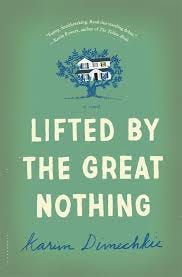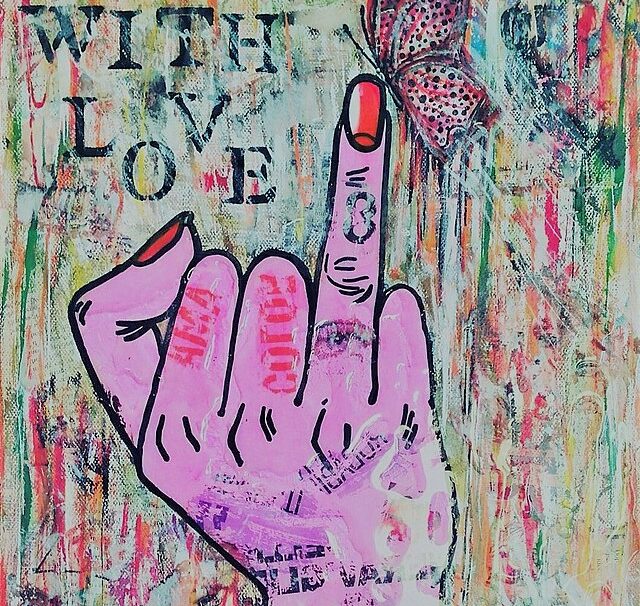interviews
The Experience and the Art of the Thing, an Interview With Karim Dimechkie, author of Lifted by the…
T


Last month, Karim Dimechkie published Lifted by the Great Nothing to wide acclaim, including high praise from The Paris Review Online and from Oprah.com, which named it one of the season’s best books. He spoke to us about his novel, what drew him to his themes, and just what the heck’s going on in that scene…
Jake Zucker: I’m always interested how a novelist — especially a first-timer — plots his work. In addition to the major motions in Max’s story, there are other more subtle wrinkles — I’m thinking specifically of Max’s relationships with students at school. It seems effortless to the reader, but was it difficult for you to conceive of that material, and how much revision and reworking did it take to space out all the digressions correctly?
…the spurts of hypnotized writing, where I’m virtually unconscious and just dreaming onto the page, are the only things I trust in the drafting process.
KD: It’s only when I’m not trying very hard that I believe I might be onto something. As long as the plot is more-or-less stitching itself together — even if it’s barely coherent — I don’t do any editing or re-plotting until the whole thing is down. Editing too early has proven to be a huge mistake for me in the past. I’ve ruined pretty much every project before this book by revising prematurely. I know not everyone works this way, but I learned that for me, the spurts of hypnotized writing, where I’m virtually unconscious and just dreaming onto the page, are the only things I trust in the drafting process. I don’t realize what I’m writing until I’ve reached the other side.
The subsequent steps are much more intentional — and that’s when I start weeding and reforming like mad. I initially wrote something closer to eight-hundred pages before snipping it down to two-hundred ninety. Relatively few digressions survived that slash-and-burn method. I made sure every deviation was thematically and emotionally important. I also wanted to leave enough space between those seeming detours for them to feel special and worthy of the reader’s investment.
And strangely, the digressions you mention, about Max’s relationships with other kids at school, are pretty much the only truly autobiographical elements in the book.
JZ: How long did that initial drafting take you, and how long did it take to winnow down the page-count? And is there a trick to getting into that hypnotized writing-zone?
KD: The initial drafting took about nine months and the culling and shaping took two years and change. The trick for me to getting into that hypnotized writing-zone is to spend all day with it, trying to get inside the world I’ve started making, letting my eyes glaze over, and literally just transcribing the voices in my head. It sounds loony because it is. I’m lucky if I get two or three of these spurts of hypnosis a day. The rest of the time I bang my head against the wall, try to get the perfect food-to-caffeine ratio going, and pace between the kitchen and my desk, talking myself into staying a writer.
JZ: You mentioned the autobiographical element. I won’t insult you by asking what in the novel is specifically autobiographical, but I will ask if there were real-life events or series of events that spurred you to take on these themes? You’re tackling heavy stuff: identity, sexuality, fatherhood, the Israeli-Palestinian conflict, the Muslim world…
I’m drawn to characters who aren’t solely defined by their national identity, color, gender, or sexuality.
KD: First let me say that I never set out to “represent” any cultural or sexual identities. When I write a character, I always start with a voice that appeals to me, and only later do I say to myself that it might be interesting if this person were gay or black or Muslim, et cetera (and in some cases I even decide whether they’re male or female after the fact). I’m drawn to characters who aren’t solely defined by their national identity, color, gender, or sexuality. Though those traits are obviously integral parts of a person’s experience, I want that to be one of five or six main traits that delineate a character, as opposed to the heart center of their being — or the reason they’re in my book. This allows me to have a person of color, for example, who has concerns and interests that are not uniquely rooted in race. It actually ends up being an effective way to have three-dimensional minorities that aren’t just functional “types” for plots sake. I feel like if I came to the page saying, Okay Karim, now you’re going to write a black character, the result would be something trite and stereotypical. Instead, I come to the page and just start recording the voice of a person and then slowly begin to imagine said person’s physical appearance.
As for fatherhood and the Muslim world, my father is a Lebanese non-practicing Muslim, and we did talk a lot about the Israeli-Palestinian conflict growing up. It’s an issue I’ve followed closely for many years with much compassion and bewilderment. Also, father-son power dynamics have been an obsession in my fiction from the beginning. My relationship with my dad has long been a central point of confusion and fascination.
JZ: Were you surprised at what you had to leave out? How painful was it to kill those darlings?
KD: I was surprised because, again, the stuff that I put the most effort into was almost invariably the weakest. So it was especially painful knowing that a passage I’d been working on for months had to get chopped. I also had to cut out a lot of jokes — and that stung.
JZ: In general, what surprised you about the process?
KD: The endless nature of it surprised me most. I can’t tell you the amount of times I thought the book was finished only to later realize how far away from the finish line I really was. It’s hard to get perspective on your own writing after having worked on it for so long. Space is essential and so is having a couple of kind and smart readers — though I always ended up feeling embarrassed by how obvious the problems they pointed out were and couldn’t believe I hadn’t seen them myself. It’s hard not to get increasingly myopic when you’re standing so close to your work for an extended period — and nearly impossible to imagine what it’s like for someone reading it for the first time.
JZ: You’ve written a novel about the Muslim world and specifically the outsider status that many Muslims experience and/or are believed to experience in the West, and a huge chunk of your story centers around Paris. Not being a psychic, of course, you couldn’t have predicted the Charlie Hedbo attacks as you were writing, but have you thought about where your work fits into the conversation thereof?
KD: I haven’t thought much about that, no. But I am pleased that my representation of Muslims in this book is pretty extremely far removed from such mindless violence. I think the main thing the book achieves on that front is in showing the variety of Muslim expressions — there is no monolith on the Muslim experience. It feels like that gets forgotten lately. I suspect there are very limited associations and images that come to mind when we hear the word Muslim. So I’m proud to have multi-dimensional believers in the novel. It’s important to increase the pool of associations we have with that word.
JZ: Right on. Switching gears: how hands-on was your editor with your manuscript, after you sold the book? Did that relationship unfold as you expected?
Not every element of your art needs an explanation that would hold up in a court of law. That’s not how art operates.
KD: The edits on the book as a whole were quite light. There were very few suggestions about the plot. Though, there was one sex scene early on in the novel that my editor thought I should cut, on account of it being supremely uncomfortable and nonessential. I also learned that certain publishing houses recanted their offers specifically because of this very scene. My editor was absolutely right about how uncomfortable it was — but also I felt it important, interesting, not at all gratuitous, and maybe even powerful. There’s something comical, only in retrospect, about having a very serious debate on whether a scene about “aided-masturbation” has the right to exist or not. In debates like this, both parties pretend to mount extremely rational arguments for or against the masturbation-scene. There’s this habit in the editing stage, and this holds true in writing workshops too, where we talk about what parts in the writing are “necessary” or “unnecessary.” I’m ultimately flummoxed by this thinking. If we’re being totally honest, virtually none of the book is “necessary.” The story could, ostensibly, be cut down to one sentence, instead of three-hundred pages. But then we lose the experience and art of the thing. So this talk of whether something is necessary or not is just a coded synonym for I liked it or I didn’t like it. Not every element of your art needs an explanation that would hold up in a court of law. That’s not how art operates.
Aside from that one moment, I took about ninety-nine percent of my editors line edits. She’s smart as a whip and was incredibly invested in making the book as smooth and clear and poignant as possible. I’m forever indebted to her for the life force she put into improving this debut. I think, together, we made it nearly twice as good as what they originally bought. A good editor is a lot like a savior.
JZ: That’s interesting. Without giving anything away to readers who haven’t come to your novel yet, was the idea that the relationship in question — between Max and the maturbation-aider — would appear as-is, just without the sex-scene-in-question? It’s hard for me to imagine that relationship without that scene. I’m inclined to think some other dramatic act would need to take its place.
KD: More or less. I think the idea was for the masturbation-aider to imply that Max should masturbate, thus breaking one kind of boundary, instead of obliterating that boundary by actually guiding him through the process.
Getting that inside view on a sexual exchange invariably makes for deep and visceral character revelations. And if nothing else, it’s exciting.
This reminds me of something author Allan Gurganus talks about: how so many literary fiction writers have this impulse to pull away from sex scenes. There seems to be a fear of appearing cheap or less literary if we actually show the sexual encounter instead of intimating it: i.e. the characters lean in for a kiss… and then we cut to the next morning with the shoes on the floor. There’s this convention that implying sex is somehow more profound than actually seeing it. This might sometimes be true, but more often than not, skipping over sex is a missed opportunity. Getting that inside view on a sexual exchange invariably makes for deep and visceral character revelations. And if nothing else, it’s exciting. There’s nothing inherently wrong with being entertaining. It’s hard to pull off sex writing, but if done correctly, I think it’s very interesting reading.









